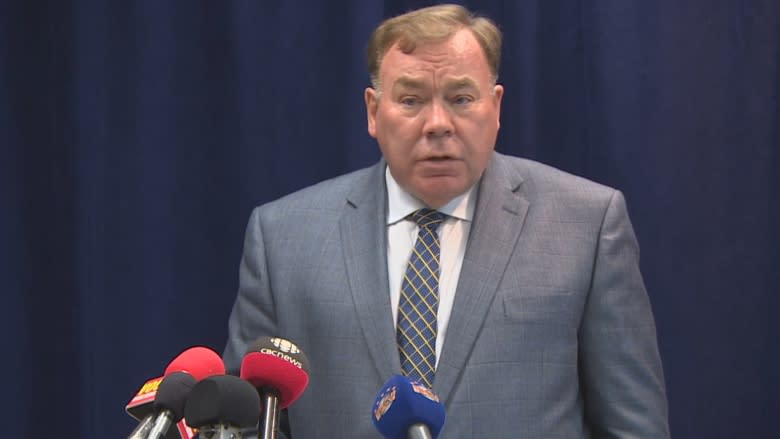Labrador's Muskrat Falls price tag now $12.7B: Worse than 1969 Quebec deal, CEO says
There has been another billion-dollar bump in the projected cost of the Muskrat Falls hydro megaproject in Labrador.
The new estimate is $12.7 billion, including financing and other expenses, according to a briefing Friday by the chief executive of Nalcor Energy, Stan Marshall.
The extra costs largely relate to the settlement of claims for past delays and changes to agreements with contractors, but Marshall also stressed that the original budget to build and operate the megaproject was way off the mark.
"I'll say this: I think this project is a hell of a lot worse … deal than the Upper Churchill," Marshall said.
"In the Upper Churchill, it didn't cost the consumers of this province a cent."
It's a scathing assessment, given that the notorious 1969 contract with Quebec is viewed as a blot on the province's history for having generated so little profit to Newfoundland and Labrador.
Consumers will see the burgeoning cost of Muskrat Falls in their power rates.
Nalcor Energy now expects that in 2022, domestic customers on the island of Newfoundland will pay 23.3 cents per kilowatt hour.
That will be nearly double today's rate, unless the government takes measures to mitigate the increase.
'I knew this was a boondoggle'
"It's a hardship to people. Why do you think I'm here?" Marshall told a room of reporters when asked about power rates doubling.
"I knew this was a boondoggle … It should never have been built. How many times do I have to say that? But it's too late to stop. We couldn't go and get a refund."
It's not only the capital cost of building Muskrat Falls that has risen — to $10.1 billion from $6.2 billion, plus financing.
Marshall said an additional $75 million a year will be required to operate the hydroelectric project, calling 2012 estimates "significantly below industry standards."
"I don't know what the motivation was. I don't know what happened and who made the decisions. Unfortunately I have seen a lot of evidence … which suggests to me that intentionally or otherwise, the costs were significantly underestimated."
Leader has to be accountable
Marshall said he will be accountable for decisions made on his watch. "My predecessors are going to be accountable for what they did."
While he said there are no guarantees overall costs will not rise again, the estimate "is the best I can give you based on the knowledge we have."
This time last year, Marshall said, he had been on the job for only three weeks and a lot of work has been done since then to come to grips with the problems.
"I said it was a boondoggle and my task was to make sure that when it was finished it won't be …. All I can do is minimize the cost going forward."
As for concern about methylmercury in the Churchill River, Nalcor has begun lowering water levels at the Muskrat Falls reservoir, upholding a commitment to Indigenous leaders made following protests at the construction site last fall.
"I am not going to do anything to endanger people," Marshall said at his news conference.
Government response
At a separate news conference Friday afternoon, Premier Dwight Ball called the Muskrat Falls project "poorly planned" and "ill conceived and reckless."
Ball also released a 2013 risk management of the project, done just after the project was sanctioned, saying it identified serious issues.
"It's shocking that the former CEO [Ed Martin] knew of these risks four years ago," Ball said, adding the response was to "do nothing."
"Shame on them," said Natural Resources Minister Siobhan Coady. "Someone must be held accountable."
Ball and Coady talked about getting the cost of an "inherited problem" under control.
"Our vision for the province does not include doubling electricity rates … rates must remain competitive," Ball said.
A forensic audit or public inquiry could be held at some point, the premier said, but not now because it would slow down the project and further increase its cost.



